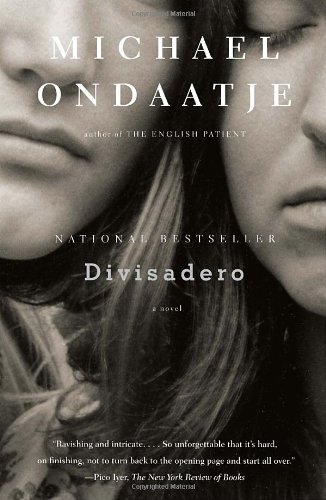Why is it that some books settle deep in our bones and refuse to leave us? Kafka says that a book might be the axe that cracks the frozen sea within us. Michael Ondaatje draws upon Nietzsche in the prologue of his fifth novel Divisadero: "We have art," Nietzsche wrote, "so that we will not be destroyed by the truth."
This is where Ondaatje's novel begins as he pulls us into the rural landscape of Northern California in the 1970s. We meet fifteen-year-old sisters Claire and Anna and their adopted older brother Coop. Soon after, we witness the violent incident that shatters this family and reshapes the rest of their lives. "The raw truth of an incident never ends," and Claire, Coop, and Anna are driven to hide in the shadows of their former selves. There is so much beauty and pain in this story that, even eight years after reading it, my skin comes alive when I pick it up and open its pages. In the hands of a remarkable poet and storyteller like Ondaatje, I return again and again to this book.
In many ways the story is a reflection on desire and art--and the dangerous spark that sometimes ignites between them. Yet there is also an extraordinary, tightly constructed narrative that continues to unfold and divide as we sink into its evocative landscape and the complicated minds of these broken characters.
Sometimes we are drawn to books for their parallels to our own lives. Other times we yearn to escape into someone else's history--only to find that we are confronted with a haunting parallel we were not anticipating. I vividly recall the day I discovered Divisadero. Or perhaps I should say the day it found me. A relentless heatwave had consumed Los Angeles and I was seeking refuge in a newly renovated air-conditioned library. When I picked up Divisadero off the shelf of new books, I felt a visceral sensation in my body, a surge of measured energy. There was nothing that could have made me put this book back on the shelf that day.
I've learned to pay attention to these kinds of signs when I pick up a book--especially now that I work in a bookstore, Book Passage in Corte Madera, California. I've witnessed the magic that books work on people. Often a customer will come to the register with a book they had not planned on buying and say something to the effect of "I don't know, this book just spoke to me," or "I think I heard something about this book." I now recognize this gaze in a book lover's eyes, something between hoping to be saved by a story and a wild-eyed look of excitement and hope. I've even had a customer (more than once) tell me that a book tumbled from the shelf on its own volition and landed at their feet. Yes, books find their readers in all kinds of unusual ways. We live between the lines of the ordinary and the extraordinary.
I had the honor of meeting Michael Ondaatje several years ago when he came to Book Passage to read from his novel The Cat's Table. I nervously edged toward him in the signing line after his reading. When I reached the table, tongue-tied, there was only one thing I could say, "Thank you. For Divisadero."
He smiled, and looked up at me with his pale blue eyes.
"Thank you," he said. "It is the book that is closest to my heart."
There was nothing more I needed to hear or say.
Mine too, Mr. Ondaatje.
Melissa Cistaro is the author of the memoir Pieces of My Mother. She is a bookseller at Book Passage in Corte Madera, California.
More Recommendations from Off the Shelf:

